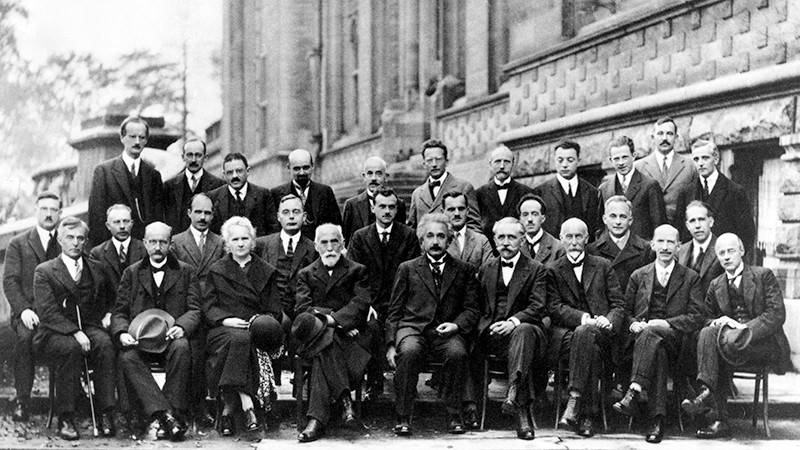IN THE NEWS - 2019
How to Counter "Manels" and Make Scientific Meetings More Inclusive
By Alexandra Witze
Look around many scientific conferences, and older, white and male faces predominate. That’s why three science groups have just published a guide on how organizers can make scientific meetings more diverse and inclusive, in part by avoiding ‘manels’ — all-male panels. The report comes from the community groups 500 Women Scientists and the Earth Science Women’s Network and the Aspen Global Change Institute in Basalt, Colorado, which organizes interdisciplinary science workshops.
Nature sat down with Angie Pendergrass, an atmospheric scientist at the National Center for Atmospheric Research in Boulder, Colorado, who coordinated the guide.
Guide to Organizing Inclusive Scientific Meetings: Where to Start
The evidence is clear: Inclusive, participatory science is better science. Yet too often at scientific meetings one perspective dominates while other perspectives are marginalized. This is not only demoralizing for many scientists, but it is bad for science as a whole. Making scientific meetings more inclusive is crucial for science and for historically marginalized people. But until recently, there was little information on how to create scientific meetings that empower all scientists to participate.
...
Creating and Publicizing a Diversity Plan
By Michael Bugeja
November 20, 2019
Diversity planning begins with a plan. Does your unit have one? Is it publicized on your departmental home page? Does your plan include realistic action items assessed annually? In this essay, I’ll describe how you can create, update and share a stand-alone diversity plan that puts everyone on record.
In 2004, I chaired the first diversity committee in my college. We all agreed that departments could do better. Essentially, we had grown weary of hearing about the importance of diversity without supporting evidence to document progress, accountability and commitment. We focused on where such a commitment was likely to be found across departments: mission statements, strategic plans and stand-alone plans.
...
5 Ally Actions
From Better Allies, Sign up here to get 5 Ally Actions delivered to your inbox every Friday.
1. Ask them to Explain the Joke
Last weekend, author Heather Thompson Day posted a tweet that immediately went viral:
“When I was 19 my boss said I should be a phone sex operator & laughed. I said ‘I don’t get it’ He said ‘it’s a joke’ I said ‘explain it to me’ & that’s how I learned that once sexual harassers have to explain why their inappropriate jokes are funny, they stop laughing.”
While we love this approach for someone who is on the receiving end of an offensive or harassing joke, it’s also something for allies to keep in their back pockets. A phrase to pull out when we hear an inappropriate joke, regardless of whether someone within earshot is personally offended or not.
“I don’t get it. Please explain the joke to me.”
2. Assume Trade Show Booth Staffers Have Expertise
At the MSIgnite conference last week, Microsoft employee Sonia Cuff witnessed an all-too-common phenomenon:
“Today at a booth when the female staffer said ‘Do you have a question?’ the male attendee said ‘Yes, but it’s a technical one.’”
Allies, let’s assume that someone working in the booth at a trade show has technical expertise in their products and can answer your questions. Even if they don’t fit the mold of what you think a technical expert might look like.
3. Share Your Questions Before the Interview
To set up candidates for success, consider sending them the questions you plan to ask ahead of time. Give them time to think, prepare, and provide an insightful answer. While this approach is especially important to candidates on the autism spectrum, it can be helpful to anyone.
For example, we heard from Dr. Jennifer M. Gómez, an Assistant Professor in clinical psychology at Wayne State University. She publishes interview questions to help all applicants be on equal footing in preparing for the campus visit:
“Questions I will ask applicants to our clinical psychology Ph.D. program are posted on jmgomez.org under the Prospective Students section. I am not looking for who has the most in-grouped privilege. I want creative thinkers, hard workers, research fit/extension, etc.”
We love it!
4. Don't Ignore Someone With a Disability
Catalyst, a global non-profit focused on building workplaces that work for women, published an infographic on being inclusive when talking to someone with a disability. It’s full of examples of what to avoid saying, and what to say instead. While the entire graphic is worth checking out, we do have a favorite…
Afraid of saying the wrong thing to a colleague with a disability, we might stay silent. As Catalyst points out, intentionally or unintentionally overlooking or being fearful of a person’s disability can feel dehumanizing. Instead of saying nothing, they recommend a simple, “Hi, how are you?”
5. Don't Ask "Why Aren't You Drinking?"
Before we know it, the holiday party season will be here. Here’s a friendly P.S.A.: Don’t ask someone why they’re opting for a non-alcoholic beverage.
There are myriad reasons someone might choose not to drink alcohol, including religious, age-related, pregnancy, addiction, and medical reasons. Additionally, some people might not want to get buzzed or just don’t like alcohol! Absolutely none of these reasons are anyone’s business, and not drinking shouldn’t make someone feel different from the group. Or that they don’t belong at the party.
...
New Study Shows How Male Allies Can Combat Sexism - Or Contribute To It
...
